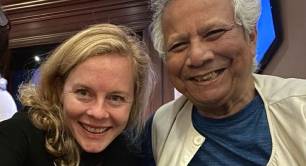The Editor's Post: The passions and pitfalls of a disruptive spirit

From banking to politics, or economics to education, a “contrarian spirit” is one of the characteristics that shone through for associate editor Anna Patton in her exclusive interview with Muhammad Yunus, as she describes in this week's view from the Pioneers Post newsroom.
“Whatever the banks do, we do the opposite,” Muhammad Yunus told me recently. That philosophy was the basis of Grameen Bank, the pioneering microfinance institution that he kicked off in 1970s Bangladesh. At that time, banks pretty much ignored the majority of the population. “They go to the rich and we go to the poor; they go to the city centre, we go to remote villages… they want collateral, we said: no collateral. And we concentrated on women, because they concentrated on men.”
That contrarian spirit is just one of the characteristics that quickly becomes apparent in Yunus the entrepreneur: a true industry “disruptor”, long before every startup claimed that term.
The Bangladeshi economics professor (who is the subject of our latest Pioneer Interview) is now 84 years old, and remains widely admired. A Nobel prize winner, he is also a bit of a celebrity (perhaps one who rather enjoys the limelight?) – over the years he has rubbed shoulders with the Obamas, Bill Gates and Oprah Winfrey, and even popped up on the TV show The Simpsons. He is also loathed – although only by one person, Yunus hastens to clarify: the prime minister of Bangladesh “hates me completely”. In January, he and three colleagues were convicted of violating labour laws, just one of more than 150 apparently politically motivated cases against him.
One of the most interesting aspects of Yunus’s life is how he was shaped by his academic studies: not for what he learned, but for what he did not learn. Economics was “an empty subject”: his degrees made him feel “useless” amid devastating famine in his home country, which drove him to venture deep into the villages to learn directly from the poorest people about how he could help. Today, he remains passionate about shaping an education system that produces not jobseekers – jobs block our creativity, he argues – but social entrepreneurs. In his 80s, and despite the best efforts of his opponents, he shows no signs of leaving that disruptive spirit behind.
SE100 award winners revealed
This week we celebrated the best and brightest of UK social enterprise, at our annual NatWest SE100 Social Business Awards in London. Hearing their stories always makes for an inspiring evening, and this year Victoria Papworth of NatWest Social & Community Capital summed up the mood perfectly, saying, “optimism is not a luxury nowadays, we need this to keep going”. Recharge your optimism levels and find out who took home the top prizes in our coverage of the awards.
Top stories
UK's best social enterprise pioneers revealed at SE100 Awards 2024
Muhammad Yunus: ‘Education gives us a passenger mentality – but we are the pilots of this planet’
Top image: Muhammad Yunus at the One Young World summit in 2013, courtesy of Flickr.
Thanks for reading Pioneers Post. As an entrepreneur or investor yourself, you'll know that producing quality work doesn't come free. We rely on our subscribers to sustain our journalism – so if you think it's worth having an independent, specialist media platform that covers social enterprise stories, please consider subscribing. You'll also be buying social: Pioneers Post is a social enterprise itself, reinvesting all our profits into helping you do good business, better.




